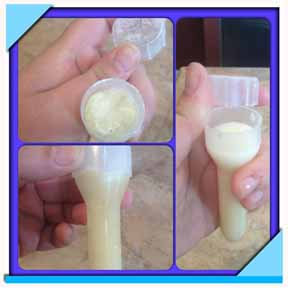Foaling Kit
I Am Ranch Miniature
Horses is sharing with you what we do to maintain the health of our
horses. We
advise you to consult your veterinarian before making any changes in
your horse's health care. The information found on our
website is not to supersede the advise of your veterinarian. I AM Ranch
Miniature Horses cannot be held liable for the care of your horse(s).
Fingernail clipper.
Clip and file my fingernails before
the excitement starts.
Small notepad and pen/pencil
to record birthing statistics.
Vet's
number - Call and notify him that things are progressing. Keep a
back up number handy.
Telephone
with vet on speed dial!
Pages of tips
from books/websites that may help you in time of emergency or dystocia.
Click here to read more.
Camera
Towels -
make sure
they are clean (no dryer sheets used), super absorbent
Betadine or Iodine
(2% or greater) for the baby's naval stump. I either dip the cord or
spray it. The spray Iodine comes in handy for treating the hooves, too.
Premixed Betadine
- wash my hands and arms if I need to enter
momma.
Arm
length rubber gloves
KY Jelly or
Vaseline - buy multiples at
the dollar store. It will be contaminated afterwards so be prepared to
throw it out.
Craft stick cut to
make a sharp edge (click here to read
Red bag information)
Flashlight/Headlight.
Ivermectrin wormer
for the mare after birth. (prevent threadworms in the foal and scours)
Fleet baby enema.
Thermometer
Foal blankets.
(Wash with no dryer
sheets. Mares have attacked their own foals if the smell of another is
on the blanket) (It helps to rub the blanket on the mare before you put
it on her foal)
Heat lamp
Suction bulb
Dental floss -
to tie cord if needed.
Baling twine (better yet would be some new, clean shoelaces) to
grab slippery foal if need be.
Banamine Do not give
until after she delivers the placenta. (1cc per 100 lbs)
Oxytocin (1.5cc per 100lbs)
Vetwrap to tie up
placenta and prevent the mare from stepping on it.
Sheet
to spread out the placenta for
examination o
Rubbing alcohol and knife to cut umbilical cord if I can't tear it.
Hemostats.
Bucket/trash bag to dispose of the placenta. Before disposing, make sure
it is all there. You can fill it with water to check for missing pieces.
Check the cord and note color, size, etc.
Bran
for mom after birthing is complete.
Tums -
to help counteract a rare case of eclampsia, pre-eclampsia or tetany
Plastic Cup - to mix
together about 1/2 teaspoon of the colostrum with a few drops of
umbilical cord blood.(or one drop of blood to one drop colostrum). If the mixture separates,
do not let the foal
drink. Call the vet. The foal could die after drinking the colostrum due
to a condition called
neonatal isoerythrolysis (aka jaundice)
If the mixture
does not separate, all is well. This condition will not show up
the first time a mare and stallion produce, but only on their
subsequent breedings.
Wash cloth/jug of very warm
water -
rinse the birthing fluids off of the udder before baby drinks.
This can also help stimulate milk let down.
Ascertain that your new baby is getting the colostrum!
Syringe that has the top cut off, the plunger is backwards to
make a breast pump for momma's teats. Pancake Syrup may be needed for an
energy boost for baby.
Freezer-safe ziploc bags to "bank" some colostrum for the future
if needed.
Measuring tape (ruler)
to measure the cannon bones and
height of the new baby.
Extra people means extra help in time of need.
| As each mare foals, prepare a
colostrum bank by milking out a little bit from each mare right
after she has her baby. Milking into the vials that syringes
come in work perfectly and are future single serving sizes.
Store in a dark bag in your freezer and date the vial with a
sharpie. Colostrum can be stored for a year. |
 |
Need more reading??
Data Collection Chart
is available to chart your mare's progression
Click
here for a foaling calculator
Click
here for a foaling kit list
Click
here for ideas of what to do 30 days prior to foaling
Click
here for a description of a redbag birth
Click here for notes about dystocia during foaling
Read
product testimonials here
Click here
for our post foaling check
list
Click here for instructions on how
to use Foal-Time Strips
We have kept extensive foaling journals to help
others.....Find them on the
articles page
|
